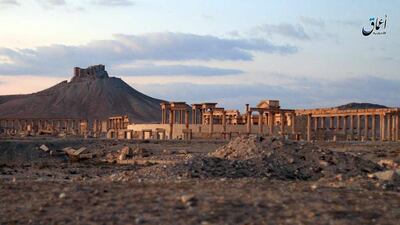ISIL returned to Palmyra this month, nearly eight months after it had been defeated there by forces loyal to the regime of Syrian president Bashar Al Assad. The capture of the desert city nearly coincided with the loss by rebel forces of eastern Aleppo. Together, these events underline the complex local and geopolitical dynamics reshaping the Syrian military landscape.
When the regime recaptured Palmyra in May 2016, it marked its victory with a triumphant concert, organised by Moscow, in the city’s Roman theatre. The loss of the city once again to ISIL is not just rife with symbolism. It demonstrates the structural weakness of a Syrian regime plagued by military manpower shortages that it attempts to make up for with Lebanese, Iraqi and Afghan militias.
Retaking Aleppo meant that the Assad regime had to reallocate resources, thus leaving other front lines vulnerable to attack. According to the Washington Institute expert on Syria, Andrew Tabler, “the regime only has about 20,000 to 25,000 deployable manpower that can go outside of front line areas, retake and hold territory”. Yet the regime’s weaknesses were not exploited elsewhere than in Palmyra, where jihadists returned in force, despite being overstretched on Iraqi fronts. With the exception of Aleppo city, other fronts separating the regime from rebel groups remained relatively calm, underlining a reconfiguration in regional powers’ calculations
In southern Syria, little activity was noted on demarcation lines pitting the rebel brigades against pro-regime forces. According to Bashar Zohbi, head of the Yarmouk Brigades, regime military forces are well fortified in this sector which makes new operations quite costly for the opposition. The rebel advance was stalled after late January 2015 when opposition forces gained control over contiguous territory encompassing most of Quneitra and the western third of Deraa. Southern Free Syrian Army sources admit that military support from Jordan is dwindling. Rebel groups believe that Jordan is more interested in its border security and the jihadi threat. Jordan seems to have agreed with Russia on neutralising the conflict in southern Syria to avoid destabilising the centre of power in Damascus.
A similar scenario appears to prevail on the northern front. Despite the outward support it shows to the Syrian opposition, Turkey did very little to avoid the fall of Aleppo. As eastern Aleppo burnt, rural rebel areas surrounding regime-held western Aleppo remained relatively unscathed. Turkey, relying on forces of the Euphrates shield composed of Syrian rebel factions including the hardliner salafi group Ahrar Al Sham, pursued instead its encirclement of Al Bab. The northern town, which has been controlled by ISIL since January 2014, represents a strategic connecting point between northern Syria, Aleppo and Raqqa. It would give the Kurds, Turkey’s nemesis, a gain by allowing it to link though its rural areas Kobani and Afrin, which would connect together the Kurdish regions in north-east Syria. Ankara appears to have won Russia’s approval to advance on Al Bab, and thus curtail Kurdish ambitions in exchange for drawing down its support for opposition rebels fighting Mr Al Assad, specifically in Aleppo.
Syrian opposition groups have followed along with their regional backers, whose focus now appears to be on the fight with ISIL and the Kurds instead of the regime. In the north, the opposition has to contend with rebel divisions, jihadi threats and Turkey’s pragmatism in Syria that has brought it closer to Russia.
With the war on ISIL taking precedence, the US retreat from the Middle East and Russia taking the lead in Syria, the international community is rethinking its priorities. Faced with mounting threats, the West and Syria’s neighbours, namely Turkey and Jordan now believe that the survival of the Assad regime may preserve their security interests. This tacit assent will confer legitimacy on Mr Al Assad.
Mona Alami is a non-resident fellow at the Rafik Hariri Centre for the Middle East

